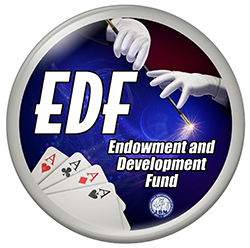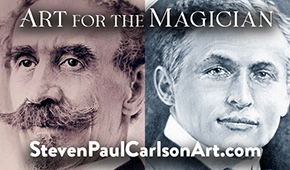EDF Contributions

CONTRIBUTIONS TO THE INTERNATIONAL BROTHERHOOD OF MAGICIANS ENDOWMENT AND DEVELOPMENT FUND
Planned Gifts
Private gifts to the Endowment and Development Fund provide a margin of excellence that helps enhance the mission of our organization. The EDF depends on the generous support of individuals who seek personal satisfaction in knowing they have helped provide for the long-term support of our organization. Each and every gift is important.
Planned gifts are gifts or commitments made in the present with the benefit to the Fund deferred until a future date. Some gifts, such as an outright gift under a donor's will or trust, are simple. Others, such as a charitable remainder trust, are more complex, providing current personal and tax benefits to the donor for a lifetime or a term of years and future benefits to the Fund.
The following information discusses various ways that planned gifts may be made to the EDF and the benefits, which may be derived.
An Overview of the Estate Tax Laws
The primary advantage of a charitable gift is to aid those causes near and dear to you. This altruistic motive, however, is certainly not lessened merely because the gift also reduces taxes. Despite the extreme complexity of the federal income tax laws, most people are familiar with the provisions allowing a deduction for gifts to qualified charities. But before you can effectively provide for a planned gift effective at your death, you also need to be aware of, and plan for, the federal estate tax.
The estate tax is a federal excise tax imposed when you transfer property to others at your death. This excise tax is imposed upon your taxable estate. Your taxable estate is determined by starting with your gross estate and then subtracting all available deductions and credits.
Your gross estate includes all property and interests in property which you own at the time of death. Ownership, however, has an expanded meaning, and will include certain interests in property deemed to be the equivalent of ownership. Examples are:
- Property that you transferred during your lifetime but in which you retained certain rights, such as the right to receive the income for your lifetime.
- Property that you transferred during your lifetime but you retained the right to revoke the transfer at any time.
Life insurance policies with respect to which you held an "incident of ownership," such as the right to designate the beneficiaries or to borrow against the policy.
Once your gross estate has been determined, there are three basic deductions that may be taken to arrive at the taxable estate. The deductions are:
- Debts, funeral expenses and expenses in connection with administration of your estate.
- The Marital Deduction. This allows a deduction for the value of all property which passes to, or to a qualified trust for, a surviving spouse.
- The charitable deduction. This allows a deduction for the full value of property which is given to qualified charities. There are provisions which require such gifts be either outright or in certain forms to qualify for the deduction.
After the value of your taxable estate is determined, the estate tax is calculated. But the amount actually payable is subject to one remaining deduction, the unified credit.
Under current law, each individual can transfer a certain amount of property free of estate tax. This is accomplished by a credit - the unified credit - which cancels taxes otherwise due. For example, if an individual's death occurs in 2003 and the taxable estate has a value of $2,000,000, the estate tax would be $780,800. This amount is reduced, however, by the unified credit. For 2003, the credit is $345,800, being the amount of tax due on a taxable estate of $1,000,000. Thus, the actual tax payable is $435,000, this being the tax on the value of the taxable estate in excess of $1,000,000.
Under the provisions of the Economic Growth & Tax Relief Reconciliation Act of 2001, the unified credit will increase, reaching a maximum of $1,455,800 in the year 2009. This credit will cancel the tax otherwise due on a taxable estate of $3,500,000. Then, there will be no taxable estate for the year 2010. In 2011, however, the estate tax is scheduled to return to the law in effect in 2001; that is, a $1,000,000 exemption and rates up to 55%.
As a result of changes in the unified credit, and other tax cuts under the Economic Growth & Tax Relief Reconciliation Act of 2001, you may find you have fewer assets in your taxable estate. Effective estate tax rates will be a maximum 45% when the new law is fully phased in. Given these rates, however, you still may wish to forego a large "gift" to the federal government and consider increasing the amount of charitable gifts from your estate.
A final note. The unified credit may also be used to cancel the tax otherwise due on taxable gifts made by you during your lifetime, but the credit can only cancel up to $1,000,000 of such gifts The credit is available to cancel estate taxes due on your estate only to the extent it has not been utilized to cancel the tax on lifetime gifts.
Why You Need a Will or Trust
This information discusses various types of planned gifts. Planning is important if your desires are to be achieved. A will or trust is essential.
People avoid making their estate plan for many reasons, none of which are particularly valid. Reasons frequently given are:
- I don't have substantial assets. The amount of your assets is not relevant. In fact, planning is even more essential with the smaller estate in order to protect it properly. If you own a home, life insurance, retirement funds or any other kind of property, you need a will or trust.
- The law will take care of it. True. But the distribution of your assets won't necessarily be in accordance with your wishes. State laws on this matter are totally inflexible. Only with a will or trust can you control exactly who will get what, when and how.
- I'll do it when I have time. Who knows how much time we really have? Planning through a will or trust should be priority.
What are the advantages of a properly planned will or trust? Consider these:
- You can provide for special needs. For example, special needs of a minor or handicapped child can be addressed.
- Provision can be made for your favorite charity. Your generosity not only helps enhance causes important to you, but also saves taxes.
- You can take full advantage of estate tax savings. Substantial tax savings are possible when assets are placed in a properly drafted trust.
- You can hand pick the persons who will handle your estate.
A proper will or trust should be prepared by an attorney to insure compliance with all applicable laws and formalities. In addition, consultation with appropriate advisors is needed to insure all benefits, tax and otherwise, are achieved.
Gift Opportunities to the EDF
We recognize that your primary reason for a gift is your desire to strengthen our organization, but such giving also has tangible personal benefits for you. Fortunately, there are numerous options available to you for making contributions to the Fund. These options can take into consideration different types of property, from cash to prized possessions, as well as different forms of gifting, from outright gifts to endowments. Regardless of the type of property or the form of the gift, we are ready to assist. We encourage you to visit with one of your representatives about your planned gift. This will not only prevent any potential problems, but will also allow us to help you get the greatest possible satisfaction from your gift.
Here are some summaries of several methods of giving and descriptions of key features to help you decide which type and form of gift is best for you.
GIFTS OF CASH
Cash is the most popular and flexible type of charitable gift. The tax benefit will depend on the income tax bracket of the donor for gifts during life and the otherwise applicable estate tax rate for gifts effective after death.
GIFTS OF LIFE INSURANCE
Do you remember why you invested in life insurance? It probably was because your estate was small or cash poor. You wanted to make sure your beneficiary would receive funds immediately.
Perhaps you don't need all that coverage today. You have other substantial investments and benefits that will yield a good income for your family after your lifetime. Yet you still have those policies.
If you're thinking about making a gift to the EDF, your life insurance could be the most sensible way to make such a gift. Consider these benefits:
- You can get a tax deduction. By naming the I.B.M. Endowment and Development Fund as the beneficiary and assigning ownership of the policy to us, you can get a valuable income tax charitable deduction.
- Your income isn't cut. A gift of an insurance policy won't reduce your current income.
- Your cash flow may increase. If you stop paying the policy premiums, you'll enjoy an increase in valuable cash. Or, if you continue paying the premiums on a policy you contribute to the EDF, you may claim the premium amount as an annual tax deduction.
- Your gift is easily arranged. You can transfer ownership of an insurance policy to the Fund without the legal expense of changing your will or trust.
- You are giving us helpful options. If the policy has a cash surrender value, we can cash it in, borrow against it for our current needs, or convert it to a paid-up policy, if necessary.
When you no longer need the protection of your life insurance, your benevolent gift to the Fund will strengthen our work and save you taxes. Here's how your income deduction is figured. When you contribute a policy on which premiums remain to be paid, your deduction generally is close to its cash surrender value - actually, a bit more. When you contribute a paid-up policy, your deduction is generally what it would cost to replace the policy at your age and state of health at the time of your gift, but never more than your investment in the policy. Your he insurance company can calculate these values.
Assuming you itemize deductions, your gift is deductible up to 50% of your adjusted gross income, with a five-year carryover for any excess.
Your life insurance is more valuable than ever. By a gift of insurance to us now, you can save taxes and increase your spendable income. Most importantly, your contribution will support our important work.In concert with your insurance advisor, we'll help you decide the way you can benefit most from your gift.
GIFTS OF REAL ESTATE
If you've been thinking about making a substantial gift to the EDF, perhaps you should consider real estate. A gift of cash or securities at this time may not be practical. Your personal residence, farm, vacation home, commercial property, or parcel of undeveloped land might be more suitable.
A present or future gift offers you the opportunity for valuable income tax and estate tax savings. You can also free yourself of burdensome management and the problems involved in selling the property or leaving it to estate liquidation. Whether we keep or sell the property, you'll make a satisfying and enduring contribution to our work.
If convenient for you, you can make a gift of real estate now. Assuming you itemize deductions on your return, you'll get a substantial income tax deduction, and you'll have the satisfaction of seeing the results of your generosity.
Perhaps an immediate gift isn't desirable. You may want to use the property a while longer or even retain lifetime use. In any case, you can still make the necessary arrangements now and benefit from a sizable current income tax deduction. When you make an outright gift of real property, you obtain an income tax charitable deduction equal to the property's full fair market value (if held long-term) instead of the lower cost basis.
Your deduction for a gift of appreciated real estate in any year is generally limited to 30% of your adjusted gross income, with a five-year carryover of the unused deduction. You can also secure a current charitable deduction by deeding a remainder interest in your personal residence to the Foundation. This lets you occupy and enjoy the full use of your property for life.
The personal residence rules also apply to a farm, vacation home, condominium, or stock in a cooperative housing corporation, if used by you. A farm may include acreage with or without the house. When you give your home or other real estate to us, you create an enduring testimonial of your interest in our important goals. Your personal satisfaction is complemented by valuable tax benefits. We'll be glad to assist you.
GIFTS OF SECURITIES
If you contribute long-term appreciated securities to the EDF during your lifetime, you get a two-fold income tax benefit: a charitable deduction for the full present fair market value, and no tax on the appreciation. The limit on deductibility in any tax year is 30% of your adjusted gross income; any excess deductible over the next five years.
GIFTS OF TANGIBLE PERSONAL PROPERTY
Maybe you'd like to contribute an art object or prized collection. Such tangible personal property is subject to special IRS rules.
Let's assume that years ago you acquired an important painting or a book or other magic collection that would now generate long-term capital gain if sold. You'd like to give this to the EDF and take a deduction for its full fair market value.
You can do this if its use is related to our exempt function. But if you're unable to establish that we can use the gift property for a purpose related to our function, you can deduct only the cost basis.
This kind of gift generally is deductible up to 30% of your adjusted gross income if it meets the related-use test. If not, and you elect to deduct its cost, the 50% limit applies. The five-year carryover is allowed for any excess deduction.
Again, if the gift is made under your will or trust after your lifetime, the full value is deductible.
GIFTS THROUGH CHARITABLE REMAINDER TRUSTS
A charitable remainder trust is established by a donor irrevocably transferring an asset or assets to the trust. The trust assets are invested to pay income at least annually to the donor or others chosen by the donor for the donor's or beneficiary's lifetime or a term of years. When the trust ends, the remaining trust assets are distributed to the EDF. Establishment of these trusts may provide an income tax deduction, estate tax savings and capital gains tax savings. There are two basic types:
- Charitable Remainder Annuity Trust: A charitable remainder annuity trust may provide tax advantages with the security of fixed income, generally for the donors and their spouses. The agreed-upon annual payments remain unchanged throughout the term of the trust agreement.
- Charitable Remainder Unitrust: The charitable remainder unitrust provides a variable income. Payment is based on a fixed percentage of the net fair-market value of the trust assets as valued annually.
A charitable remainder trust can offer many advantages to benefit you. These include:
- Income for life.
- With a unitrust, a hedge against inflation.
- Immediate tax savings.
- Potential avoidance of capital gain recognition on assets used to fund the trust.
Most importantly, you are making a personal commitment of a significant gift to the EDF to help with its work.
Charitable remainder trusts are subject to restrictions imposed by federal law, both as to the amount payable to you during life and the minimum value which must pass to the EDF. Consultation with an attorney is essential.
GIFTS THROUGH THE CHARITABLE LEAD TRUST
Suppose you would like to give us an income from certain assets for a number of years. Then you want the principal to be given to your family -- or returned to you. In a nutshell, that describes a charitable lead trust. You will enjoy valuable tax benefits without forfeiting the trust principal. Even more importantly, you will gain the personal satisfaction of supporting our pressing needs during the coming years.
You can have a lead trust set up during your lifetime, but it is more beneficial, tax-wise, if you create it to be effective after your death.
There are two types of lead trusts:
- Guaranteed Annuity Interest. Under this plan, the trust pays us a fixed dollar amount annually for the term of the trust. You determine the amount at the outset. The trust will last for the number of years you specify in the trust document.
- Unitrust Interest. In this variation, the trust pays us an amount each year determined by multiplying the fair market value of the trust assets by a specific percentage, which is established at the start. The amount is computed anew annually, using the current valuation of the assets. Here again, the term of the trust is limited to the number of years you select.
- If you have a substantial estate and you anticipate high federal gift and estate taxes, the lead trust was meant for you. The trust property can be passed down to your children, grandchildren, and others either entirely free of or at greatly decreased gift and estate taxes.
There are other combinations of trust payments and terms that can almost completely bypass both gift and estate taxes. According to tax rules, the gift to your family is the actuarial value of their right to the trust assets when the trust ends. The larger the annual payouts and the longer the term of years, the smaller the tax exposure.
You can also establish a lead trust effective during your lifetime that returns the trust assets to you after a number of years. If properly structured, you will be entitled to an income tax charitable deduction for the payments to us, but you will be taxed on the income you do not receive -- unless you fund the trust with tax-exempt securities. The value of the trust assets will be included in your gross estate for federal estate purposes.
A lead trust offers you a good way to carry out your philanthropic plans over the coming years-using monies that might be expended largely on taxes. Plus, you keep ultimate control of the trust assets within the family.
Should you create a charitable lead trust? Before answering that questions, you will want to review your financial, tax, and family circumstances with your advisors.
ENDOWED GIVING
Here's an exciting idea you might not have considered before. You can endow a favorite collection, program, or project. This could be the most farsighted and enduring act of your lifetime. The memory of your wise philanthropy would become immortal. What is an endowment? It's simply a gift made to establish a perpetual fund, with distributions made only out of investment income of the fund. These distributed earnings are used only for the designated purpose you establish to provide financing of a matter that is close to your heart.
We can't imagine what you have in mind, but we can give you some examples. Then let your imagination roam.
Perhaps you have a valuable collection you've spent years amassing, one that you are certain others would appreciate long after your lifetime. Yet the ultimate recipient of your collection might not be able to supply the needed space and care without the funds you could provide. Then again, maybe you would like to see an annual award presented to an individual who has shown outstanding achievement in our organization that you believe requires strong recognition or encouragement.
Another possibility is the funding of a particular program or project that you want carried out and for which no one else has taken the initiative. This might be a specific problem or a promising opportunity.Worthy and memorable enterprises have been endowed by people of exceptional vision. Think of the Nobel prizes given for outstanding achievement in physics, medicine, peace, and other fields of endeavor; the Mellon contributions to sustain great art; and the Ford, Carnegie, and other great foundations that make grants to innumerable deserving causes. Of course, you don't expect to set aside a fortune the size of these. But in your own way, for the special cause that means so much to you, you, too, can create an endowment and make it happen.
Creating an endowment demands careful planning. Although you might establish a foundation or trust, it is easier to donate or bequeath funds directly to the EDF and let it implement your wishes, specifying how you want the endowment used. Because of the long-term nature of the fund and the language needed to ensure that your intent is realized, experienced counsel by your attorney and the Foundation is vital. We'll be pleased to explain how we can help you accomplish your goals and achieve the recognition you richly deserve.
Option Giving When Renew Membership
Be aware that when you renew your I.B.M. membership, there is a place on the form for you to make a contribution to the I.B.M. Endowment Fund. This is an easy, annual reminder to make a contribution. Please be as generous as possible, on behalf of the future of the magical arts.
In the information above, we have offered you ideas on some of the ways you can contribute to the EDF and achieve goals important to you. In the most recent tax law, Congress has again emphasized the vital importance of voluntary charitable gifts and has continued exemptions from taxation. It is important that you act to advance the charitable purposes of your choosing.
We appreciate your generosity. Please contact us if you have questions or if we can be of assistance.
And Now, A Word From Our Legal Counsel
The I.B.M. Endowment and Development Fund and its representatives are not engaged in rendering legal or tax advisory services. This information is intended to provide accurate and authoritative information of a general character only. Individual state laws govern wills and trusts and may impact charitable gifts made through contractual arrangements. Advice of legal counsel should be sought in specific cases.











